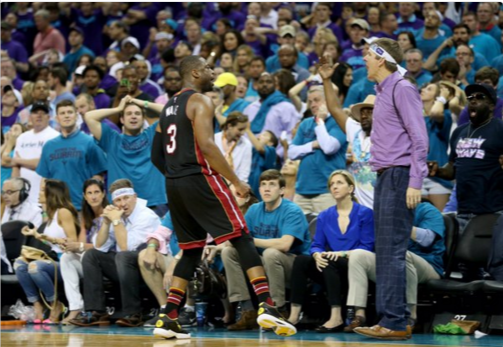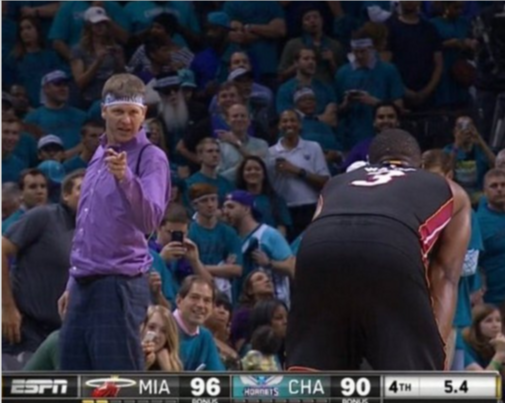Dwyane Wade, like former teammate LeBron James, was made for one of the most underrated crucibles in all of sports.
Most sports fans and analysts pay close attention to Game 7s, those moments when a long series reaches the ultimate crescendo. Yes, Game 7s are almost always special, and they certainly reveal what exists inside the men who contest them. Game 7s aren’t overrated, but they do tend to obscure the enormity of a nearly-as-important scenario in these long playoff series which fill an American springtime.
Game 6.
The lower seed leads, 3-2, and can close out the series.
A proud higher seed — almost certainly entering the series with higher expectations and more internal pressure — has to win on the road, or its season is over.
It was in this cauldron of scrutiny that LeBron James played what was — adjusted for the circumstances — the greatest game of his career in the 2012 Eastern Conference Finals against the Boston Celtics. If LeBron hadn’t gone thermonuclear against Doc Rivers’s last Celtic team, the history of this decade would have been dramatically different…
… but it wasn’t. LeBron stood athwart history and told Boston, “STOP!”
LeBron saved the Heat’s season that night in New England. He forced a Game 7, which Chris Bosh won with a brilliant display of three-point shooting after returning to the lineup following an abdominal injury. Once the Heat cleared that hurdle in the East, they didn’t look back in the 2012 NBA Finals against the Oklahoma City Thunder.
*
Friday night in Charlotte, the 2016 Miami Heat — not saddled with the expectations of the 2012 club, but not able to put Chris Bosh on the floor this time — returned to a Game 6, on the road, staring elimination directly in the face. The Charlotte Hornets had won three straight against them, holding Miami under 89 points each time.
The Hornets also had Kemba Walker on their roster, and in Game 6, Walker tossed in 37 points with one ridiculous shot after another:
.@KembaWalker Full Highlights 2016 Playoffs R1G6 #Hornets vs Heat – 37 Pts, 5 Assists!https://t.co/f74p9rlDH0
— FreeDawkins (@DawkinsMTA) April 30, 2016
While Walker dazzled with his fabulous feats and HORSE shots, Miami desperately searched for bread crumbs of fourth-quarter offense, part of a steady erosion of late-game production ever since the third seed took a 2-0 lead in this series.
The Heat — especially without Bosh — have needed to lean on rookies Justise Winslow and Josh Richardson for active, fresh-legged defense and timely perimeter shooting to keep defenses honest, with Hassan Whiteside needing space to operate in the paint. These young guns fueled the Heat’s late-season surge without Bosh on the floor, so they had to remain a core part of the rotation in the playoffs. Coach Erik Spoelstra threw them into the lion’s den, and while Games 1 and 2 couldn’t have worked out more beautifully for the Winslow-Richardson tag team on the wings, Games 3 through 5 told a very different story.
Winslow had his moments attacking the basket in Game 4, and Richardson hit a few meaningful baskets in Game 5, but the broad canvas of a 48-minute game with a 24-second shot clock remains daunting for NBA rookies in the playoffs. So many more possessions are involved, compared to the college game they recently left behind. So many more successful repetitions are needed to reach the finish line.
As this series shifted to Charlotte and then became a real fight once the Hornets punched back, Winslow and Richardson found it progressively more difficult to operate. The easy flow of Games 1 and 2 became a distant memory, and when Richardson heaved two long misses late in the Game 5 loss on home hardwood, the Heat’s most emergent perimeter shooter over the past two months experienced his first profound taste of playoff failure.
As the Heat confronted the possible end of their season in a loud enemy lair, their rookies — who played well in the first half — receded into the background when this game’s most decisive moments arrived.
Winslow was benched by Spoelstra for most of the second half. Richardson picked up a shoulder injury at the worst possible time. The team which had to give its rookies on-the-job training could no longer expect offensive production from them — not in the fourth quarter of Game 6.
Hassan Whiteside — victimized by some truly awful foul calls — nevertheless allowed his emotions to get away from him. He descended into foul trouble and was unable to be an offensive hammer in the paint.
Joe Johnson remained conspicuously quiet. The man who used to be a magnet for big shots (whether good or bad) has continued to be a peripheral figure in this series.
Goran Dragic — who has struggled at both ends of the floor in this series, and has been unable to flourish in transition, which is supposed to be his foremost strength — competed well in this game, but made only 6 of 17 shots. Since his Game 2 masterpiece, Dragic has hit only 36 percent of his shots, and only two threes. He did not make himself a solution for the Heat in the fourth quarter.
There was only one person Miami could turn to, the man who watched LeBron own the stage four years earlier in Boston.
DWADE TAKING OVER https://t.co/b1PqndlhDm
— Basketball Forever (@bballforever_) April 30, 2016
https://twitter.com/SportsQuotient/status/726238869813911553
Just a few weeks ago, the NBA community reveled in Kobe Bryant’s 60-point career finale against the Utah Jazz. Kobe represents that basketball identity which is simultaneously so captivating and yet so uneasy to observe: the hero-ball master.
There is something so quintessentially American about hero-ball. It is the classic portrayal of rugged individualism, taking matters into your own hands, insisting you’ll do what others might not have the stomach or the talent to achieve in a moment of crisis.
There’s a part of each one of us which loves hero-ball. We love seeing LeBron take over in a Game 6 on the road, facing elimination. We love seeing Kobe deliver daggers with everyone else clearing out of the way. One problem with hero-ball, though, is that in the case of Carmelo Anthony with previous Knicks teams (not as much in the past two to three seasons), the solo-flyer approach puts a stop to ball movement. Another deficiency of hero-ball is that it plants the seed in the minds of other players — DeMar DeRozan is a good example of this right now in the Toronto Raptors’ series against the Indiana Pacers — that they can do what Bron, Kobe, and the other masters manage to do when all the pressure’s resting on their shoulders.
For the Miami Heat, entrusting Game 6 to Dwyane Wade as a hero-ball merchant did not make sense on a number of levels. This fact most centrally captured Spoelstra’s exquisite dilemma, with the rest of his offense once again bogging down in the final minutes of regulation:
Dwyane Wade was 0 for 21 from 3 in his last 56 games before that make moments ago.
— Tim Reynolds (@ByTimReynolds) April 30, 2016
Nothing about a D-Wade 3-point attack in the final minutes of Game 6 — with Kemba Walker becoming the young-gun takeover artist Flash used to be — was a high-percentage play by Spo.
Yet, in fairness to Miami’s coach, that’s precisely the point: There WAS no high-percentage play left for the Heat.
If they were going to die, they had to die with their hero firing the bullets.
Hero-ball looks awful when shots badly miss, but oh, when the ball tickles twine, and we get visuals such as this, it’s one of the most arresting and emotionally satisfying scenes in sports:
Purple Shirt Guy rode Dwyane Wade all night, but he didn’t have the sense to stop once he knew his team had been shot down by hero-ball… and a legendary player who might not have played the percentages, but whose competitive DNA was made for such a moment.
Flash is back — as a crunch-time warrior who carried his team over the hot coals of a Game 6 eliminator on the road.
Flash is back — the man who found a way to hit the shots he hadn’t made at all (literally!) in 2016, precisely when the survival of his season depended on it.
Flash is back — home for Game 7.
If there’s ever a time when hero-ball needs to work, Game 6 with the road team on the verge of elimination fits the bill. Dwyane Wade used to be what Kemba Walker is now. That version of D-Wade could be a hero every night — and often was. The older D-Wade can’t expect to be — not throughout these playoffs, and not in Game 7 on Sunday.
Game 7 analysis can wait, however. Friday night, the Miami Heat had no choice in Game 6 in Charlotte: They needed a flashback from Flash, and they got it.
A hero did what he was born to do.


